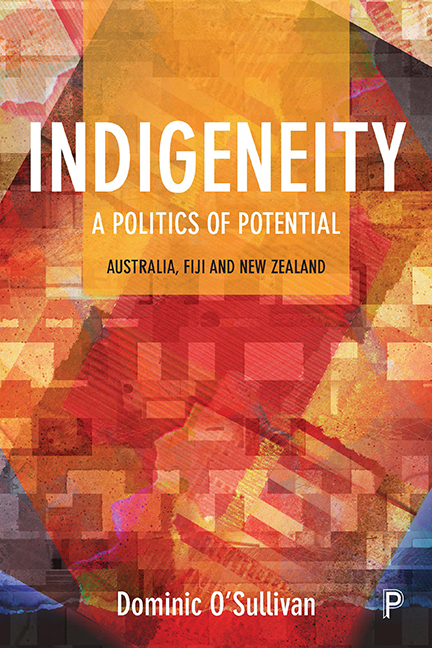Book contents
- Frontmatter
- Dedication
- Contents
- Acknowledgements
- Introduction
- one Reconciliation
- two The politics of indigeneity
- three Liberal democracy and differentiated citizenship
- four Liberal democratic inclusion
- five Indigeneity and contemporary globalisation
- six Economic development as differentiated citizenship: Australia
- seven Economic development as differentiated citizenship: New Zealand
- eight Economic development as differentiated citizenship: Fiji
- Conclusion
- References
- Index
Introduction
Published online by Cambridge University Press: 05 April 2022
- Frontmatter
- Dedication
- Contents
- Acknowledgements
- Introduction
- one Reconciliation
- two The politics of indigeneity
- three Liberal democracy and differentiated citizenship
- four Liberal democratic inclusion
- five Indigeneity and contemporary globalisation
- six Economic development as differentiated citizenship: Australia
- seven Economic development as differentiated citizenship: New Zealand
- eight Economic development as differentiated citizenship: Fiji
- Conclusion
- References
- Index
Summary
Indigeneity is a politics of potential that transcends neocolonial victimhood. The book's principal purpose is to explain how and why. It does so by showing that indigeneity's relationships with discourses of reconciliation, self-determination and sovereignty allow people to find ways of asserting their culturally framed political rights of prior occupancy. These rights are potentially realised through differentiated liberal citizenship, or ‘belonging together differently’, in a single non-colonial state (Maaka and Fleras, 2005). Thus the book's unifying concern is with the intersection of ideas about the terms of indigenous peoples’ belonging to the state, and the nature of their citizenship and participation in public life. It is also concerned with the preservation of independent indigenous political authority. The Introduction explains these theoretical perspectives, their context and the reasons for the book's comparative approach.
The politics of indigeneity seeks space for indigenous political structures to emerge and enjoy meaningful policy influence. Indigeneity itself is grounded in neither class nor ethnic minority politics. It challenges and transforms postcolonial understandings of power, politics and justice to take an expansive view of what counts as fair and reasonable. In particular, it makes citizenship a ‘political practice…not just…a legal or administrative status’ (Stokes, 2000, p. 232). It challenges the Left's traditional preoccupation with class and gender politics, and its ‘excessive faith in the ability of democratic participation [alone] to solve the problems of citizenship’ (Kymlicka and Norman, 1994, p. 359), while also calling into question the Right's emphasis on the individual, often without reference to the collective claims that are, for indigenous peoples, preliminary to personal liberty. The book contests the argument that liberalism's concern for the individual prevents institutional attention to difference. Instead, it affirms Kymlicka's position that ‘membership in a cultural community may be a relevant criterion for distributing the benefits and burdens which are the concern of a liberal theory of justice’ (Kymlicka, 1989, p. 162).
The Australasian states are compared with Fiji to demonstrate that historical constraints on political authority are not removed with the withdrawal of the colonial power alone.
- Type
- Chapter
- Information
- Indigeneity: A Politics of PotentialAustralia, Fiji and New Zealand, pp. 1 - 16Publisher: Bristol University PressPrint publication year: 2017

